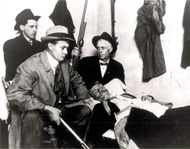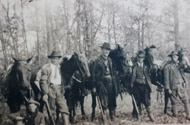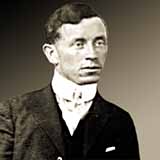

T.L. Felts following the capture of Floyd Allen after the Hillsville Courtroom Massacre.

Baldwin-Felts Detectives

C.E. Lively
Private detectives in the latter part of the 19th century were a vital institution of law and order. At this juncture of American history, the nation was just barely over a hundred years old and systematic policing systems were either non-existent or in the fledgling states of existence. The West Virginia State Police, fourth oldest in the nation, would not be founded until 1919, just one year before the Matewan Massacre. C.T. Blankenship who was the sheriff of Mingo County in 1920 referenced his county agency: "I never had but six men, and they were tax collecting deputies. I finally got the court to give me two other men, at $100 a month. That was the force that I had here — eight men, and they had to cover the whole county."*
The role of private detectives fell into three basic categories:
-
Guards - Private Detectives played a crucial role in guarding payroll shipments and private property. "If you were running a big payroll of mine money from Philadelphia to Gary and you wanted to make sure that money got there, you were most concerned with safe guarding that payroll and if you had inefficient or non-existent law enforcement along the way, you had little alternative but to turn to men like Tom Felts, who could and would guarantee delivery of the goods."**
-
Investigators - "Sabotage, a term borrowed from French syndicalists by American labor organizations at the turn of the century, means the hampering of productivity and efficiency of a factory, company, or organization by internal operatives. Often sabotage involves the destruction of property or machines by the workers who use them. In the United States, sabotage was seen first as a direct-action tactic for labor radicals against oppressive employers."*** Private Detectives were instrumental in investigating the many acts of sabotage perpetrated by supporters of the union movements against non-union coal mine operators. Arson, destruction of property and murder were prime areas of investigation that inept or non-existent local law enforcement agencies were unable investigate.
-
Secret Service Agents - During investigations, Private Detectives often had to resort to assuming other personas to further their ability to gather information. C.E. Lively, who would play a cental role in investigating the Matewan Massacre, was hired by the Baldwin-Felts Detective Agency in 1912. As one of his first jobs, Lively was sent to Colorado during the UMW's attempts to unionize Colorado in 1913 to investigate the murder of four mine guards. Once in Colorado he infiltrated the UMW and became vice president of the local in La Veta where the murders had taken place. Testifying before a congressional committee in 1921 Lively stated, "My investigation led to the getting of a lot of evidence that had not been gotten and to the locating and apprehending of one man that was implicated in that murder. The others had already been arrested. John Flockhart was secretary of the local at La Veta, and was also working for the United Mine Workers on a salary. I found on investigation that he had furnished some of the rifles and had planned it and told the place to go to do it."
-
Secret Service Agents were also used in gathering information as to the identification and movements of union sympathizers in work sites which were then reported to the management of the coal mining operators. This activity was much maligned by the unions for it lead to the firing of these miners and eviction from the company owned homes.
* http://babel.hathitrust.org/cgi/pt?id=nyp.33433004757229;view=1up;seq=5
** Transcript of interview with Stuart McGehee, June 8, 1992, for the film"West Virginia" http://www.wvculture.org/history/wvmemory/filmtranscripts/wvmcgehee.html